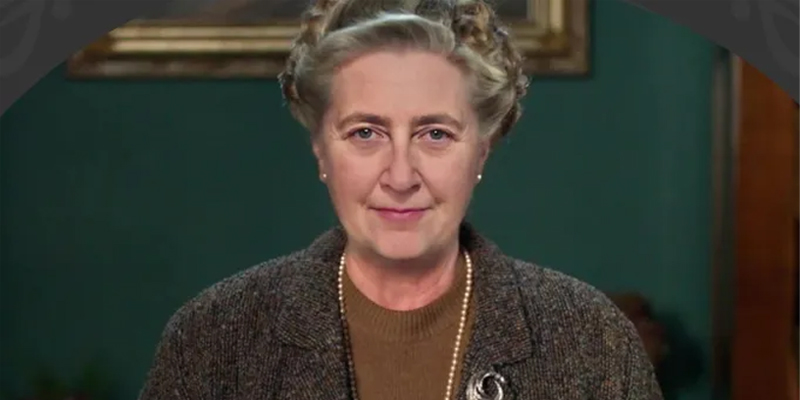
An unsettling AI Agatha Christie is here to teach you how to write.
Now here’s a mystery: how is a writer who died in 1976 teaching a new writing course? With a little help from academia and a little help from AI.
That’s right, it’s not Poirot, but generative programming that has raised the writer Agatha Christie from her grave for a new BBC Maestro online course. The new series was produced in partnership with Agatha Christie’s estate, headed by her great-grandson, James Prichard.
As far as AI slop goes, this isn’t the sloppiest: generative programs were used to alter the voice and face of Vivien Keene, the actor playing Christie, and the rest of the project was written and researched by a human team of Christie scholars. Keene got the role of body double after a casting process that started with a “biometrics test” to see if her face was the right shape, and most of her performance involved trying to sit as still as possible: “[Keene] revealed that she had to perform as Christie while barely moving her face and staring down the camera as Christie was never filmed from the side.”
But none of this research and rigor saved the final product from being deeply uncanny. The video trailer has a wild jump scare when Christie’s marionetted
face is revealed. It looks strange—for all of the marketing bluster about how good AI is getting, 2025 robo Christie doesn’t look much better than the 2001 CGI of Tony’s mom in The Sopranos. This is the same problem that so many AI things run into: it doesn’t look very good.
What’s the point of using the AI, then? It feels like an unnecessary gimmick that is reinventing something that doesn’t need reinventing. Why not just have Vivien Keene play Christie? I know that that Cillian Murphy’s face doesn’t look exactly like Robert Oppenheimer’s, but it doesn’t pull me out of the movie. The opposite is happening with this BBC Christie: there’s an uncanny valley strangeness to robo-Christie that makes me uneasy.
To their credit, Christie’s great-grandson James Prichard was skeptical of using AI, saying that he’d “be lying if I said there weren’t worries”, but that the usage was ultimately limited enough for him.”This was not written by AI,” he explained. “It is a leading academic unearthing everything that she said about writing. And I believe that what we are delivering here in terms of her message is better presented and will reach more people as a result of being presented, if I can use inverted commas, ‘by her.’”
I’m glad the scripts weren’t generated by a program, but again, I don’t see what AI is adding. The choice underestimates an audience’s ability to understand fiction. Maybe I grew up watching too many “dramatic reenactments” on TV, but being presented with an actor playing a historical figure is just as legible as a rubbery digital mask with a mouth that moves on unnatural axises.
My guess would be that this is a proof of concept for more planned courses taught by AI-teachers. Nicki Sheard, the CEO of brands and licensing at BBC Studios talked about how excited the company is for the Christie project, saying the AI “deploys incredible care and craft, great thought and the utmost respect to all of the contributors” and that “the underlying IP is particularly special to us.”
I’m glad BBC cleared this project with the Christie estate, because that hasn’t been a given: Peter Cushing’s family sued Disney when the actor’s likeness was recreated for a Star Wars movie. And Christie’s estate was able to put some good pressure on the production, apparently stipulating that all of the words spoken in the video had to come from Christie. Though I wonder if she ever wrote the line we hear in the trailer, “This is my BBC Maestro course on writing.”
I have a feeling that future projects won’t be as careful, and will be much more bold and overreaching. After all, there’s so much special IP out there to deploy AIs on.
As more of these generatively enhanced projects pop up, they reveal how antisocial the tech industry’s view of the world is. Instead of taking a course with a human teacher, you can take an AI-enhanced writing workshop or an “AI-first” Duolingo class. Instead of trying to meet people with a friend, you can use Grindr’s AI wingman, built with all your data that it gave to Amazon. Instead of live music, you can see a hologram. Instead of making friends, you can make up for your below-average friend number with Zuckerberg’s chatbots. For all their claims, I don’t think that any of these corporations are lying awake at night worrying that you’re lonely.
We don’t have to live like this, people!
James Folta
James Folta is a writer and the managing editor of Points in Case. He co-writes the weekly Newsletter of Humorous Writing. More at www.jamesfolta.com or at jfolta[at]lithub[dot]com.



















